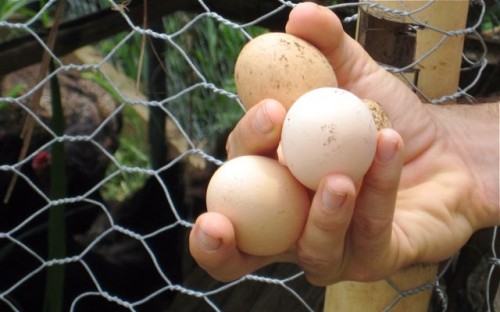If you’re interested in foraging, your best source of information is going to be a local forager who knows what’s available in your area at different times of year. You next best would be a book by a local forager. Third best, but better than nothing, would be FM 21-76 the (not copyrighted, because it’s a U.S. government publication) Army Field Guide to Wild Edible Plants.
Tag: locavore
The other reason to raise chickens

So, the Champaign City Council legalized backyard chickens a while back. You have to file a form, pay a one-time fee, and get a notarized permission slip from your landlord (if you’re a renter), but it all looks quite doable. As I’d mentioned when I wrote about the issue before, this would have been a determining factor in my willingness to buy a house in Champaign, and now it isn’t. The fee isn’t cheap ($50), but figured into the cost of buying a house, it’s insignificant.
But thinking about the fee got me to thinking about why one raises chickens in the first place.
Probably most of the people in Champaign who want to raise backyard chickens are yuppy locavore types looking to reduce their food-miles to minimize their carbon footprint and know that they’re eating organic and cruelty-free. More power to them. But there’s another category of people who might raise backyard chickens: poor people.
Someone who’s poor—someone whose budget barely stretches to cover their other expenses, someone who’s on food stamps, someone who uses a food pantry—is another person who might find raising backyard chickens very attractive. Eggs don’t cost much, but someone who raised chickens might be able to save a few dollars a week and get some high-quality protein and have a surplus that they could share or trade. But a $50 entry fee just about blocks this reason to raise chickens.
I guess I’m not really surprised. Local politicians in Champaign have a lot of incentive to help upper-middle class people eat local and organic—those people vote. They probably don’t feel the same pressure to help poor people get a little high-quality food as cheaply as possible, because poor people don’t vote as much—and when they do vote, the legality of backyard chickens probably isn’t a top issue.
It does bug me just a little that Champaign (which thinks of itself as conservative place) has created this whole big-government scheme with forms and approvals and fees and regulations on chicken coops, while Urbana (which thinks of itself as a liberal place) doesn’t have any of that stuff, just a general rule against letting your animals become a nuisance. But that’s just me, asking for consistency from politicians.
So, half a cheer for Champaign legalizing backyard chickens, even if they came up with a way to do it that only helps yuppy locavores and not poor folks.
Eating native food
This great article in Al Jazeera America hits a whole bunch of my interests: healthy eating, decolonization, sustainability, preserving culture: Eating indigenously changes diets and lives of Native Americans. Basically, more than one group of researchers who are also Native Americans have decided to look into seeing if they could eat the way their ancestors ate.
Reinhardt, a professor in the Native American Studies program, was helping to serve up fry bread, Indian tacos and other offerings at the annual First Nations Food Taster, a fund-raising event for the Native American Student Association, when he had an epiphany: “Would my ancestors even recognize this as food?”
If you, like me, are a fan of Michael Pollan’s work, there’s a lot here to find interesting. There is considerable overlap with the “paleo” diet (although the researchers set their time threshold at 1602, rather than the dawn of agriculture) and with the locavore movement (with different locales for different Native American researchers).
The article touches on all sorts of question: Do we even know what they ate? Are the plants and animals still available? Is such a diet healthier than a modern Western diet?
Interesting as the food issues are, the issues having to do with decolonization are at least as interesting, as are the issues having to do with sustainability.
